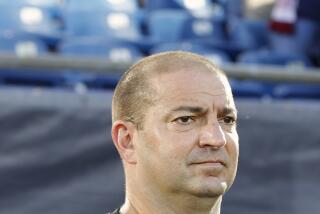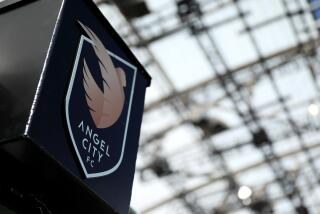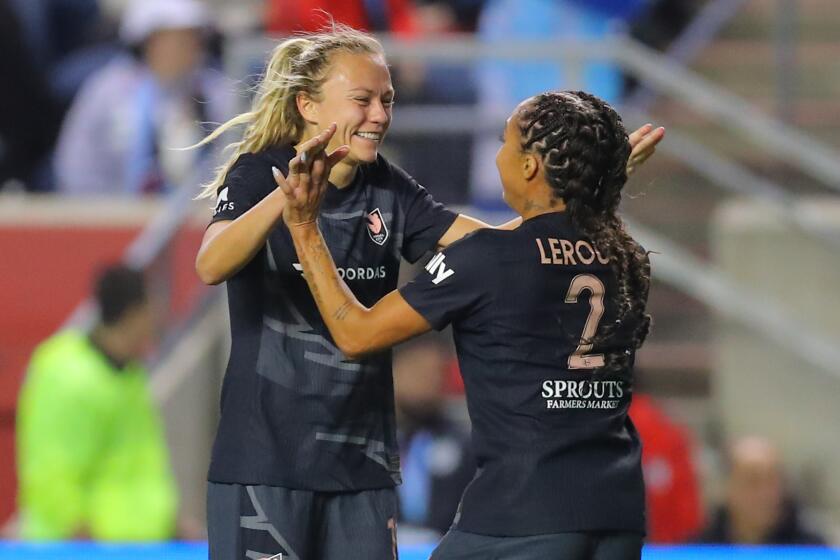Iraq salutes its Asian Cup finalist
They’re stocking up on fuel for their generators, snapping up flags and team T-shirts, and decorating their cars with flowers.
Soccer fever has reached new heights in Iraq ahead of the national squad’s first-ever Asian Cup final.
In a few short weeks, the 15 young players have achieved what Iraq’s political and religious leaders have struggled to accomplish in four years of war: uniting their country and restoring a sense of national pride.
“We wish these players sat in the chairs of those politicians,” said Ali Mohsin, a Baghdad civil servant. “They did a marvel for us
Each improbable Iraq soccer victory has been met with an outpouring of joy, a rare feeling in this bloodied country. Thousands poured into the streets Wednesday when Iraq’s team edged South Korea to clinch a coveted spot in Sunday’s final against Saudi Arabia.
“From the north to the south and the east to the west, everyone was celebrating and chanting, ‘one Iraq,’ ” said Mohammed Khalaf, a former team captain and popular TV commentator who now directs the coverage of the state-run Iraqiya Sports Channel.
Shiite and Sunni Muslim friends who can no longer visit each other’s neighborhoods, for fear of being shot, found each other again amid the throngs who were dancing, drumming and spraying each other with water and party foam.
“There were people in my club that I hadn’t seen for two or three years,” said Uday Fadhil, a Shiite trucker and avid member of one of Baghdad’s premier soccer fan clubs. “But I saw them in Karada during the celebrations.”
Fadhil has already started decorating his car with flags and garlands of flowers in anticipation that the team will bring home the cup from Indonesia. “This is the only happiness we have had in a long time,” he said. But that happiness is often short-lived. About 50 fans died Wednesday when two suicide bombers drove their explosives-laden cars into the crowds celebrating on opposite sides of Baghdad. At least four more were killed by stray bullets from the thundering celebratory gunfire that day and after Sunday’s quarterfinals win over Vietnam. There were also reports that gunmen used the festivities as cover to settle private scores.
It was a tragic reminder of the vicious violence tearing at Iraq. But the fans insist they will not be cowed.
“If the team wins this time, I will still go out into the streets and celebrate. I don’t care if the terrorists ambush us,” said Saif Hasan, a Baghdad college student. “I will be wrapped in an Iraqi flag
Since Wednesday, Iraqi TV stations have been replaying footage of each goal and the celebrations that followed. Parliament opened its Thursday session with a congratulatory statement for the squad. And sheikh Jalauddin Saghir praised the team during Friday prayers at Baghdad’s revered Buratha mosque for “sending a message to the whole world that this society, despite all the terrorists, will remain unified.”
In a shady Baghdad alley Friday, four friends rehashed every detail of the semifinal won 4-3 on penalty kicks after a 0-0 tie in regulation.
“We were on edge and kept swearing and calling the names of players when they missed a goal,” said Amer Hadithi, who supplied the generator that allowed them to watch the match despite the inevitable power cuts. After the win, they jumped up and down and shouted with joy, before remembering to be quiet to avoid drawing the attention of militants.
The four -- a Shiite, two Sunnis and a Christian -- plan to meet at Hadithi’s apartment again for Sunday’s final. “It is the only thing that could make us happy at such a time,” he said.
The team’s mixed makeup and its ability to beat the odds has been an inspiration to the fractured nation. Its Brazilian coach, Jorvan Vieira, had only two months to prepare the squad. Players had to shuttle between their local clubs and national practices in neighboring Jordan; some received death threats, or had loved ones kidnapped and killed.
Sunday’s game against Saudi Arabia, a bitter rival accused by Iraq’s Shiite-led government of supporting Sunni Arab insurgents here, is loaded with symbolism. Um Zainab, an east Baghdad housewife, said she doesn’t usually follow soccer. But this time is different.
“I am so excited about watching the game with my husband and children ... I am uncontrollable,” said the woman, who gave a traditional nickname. “The last time the team won, I handed out candies to the neighbors.”
Hussein Gitain, who has played for numerous local clubs, said his wife had made a vow to cook a big meal for the poor if the team wins Sunday.
Ilias Yusuf Gorges, a Baghdad tailor, estimates he has sold at least 1,500 flags since the start of the Asian Cup.
“We ran out of stock the day before yesterday, when the team won over South Korea,” he said. There were thumping street parties in Basra, Kirkuk and Mosul. The festivities were more muted in Baqubah, where U.S. and Iraqi forces have waged an offensive against Sunni Arab insurgents.
“We wish that we can go out and celebrate in the streets like the people did in Baghdad and other parts of the country, but there are checkpoints all over the city,” said Imad Zuhairai, a Sunni real estate agent.
Iraq’s love affair with soccer has been deep and long. The sport has provided one of the few escapes.
At that time, players say they were driven as much by fear as a love of the game. Those who disappointed the head of the National Olympic Committee, Hussein’s son Uday, could be thrown into jail, beaten on the soles of their feet or humiliated by having their heads shaved.
It was an uninspiring time to play, said Adnan Hussein, who played for the National Youth Team and other clubs during the 1980s. “Now, when the team plays, it is for the people and the country,” he said. “It is full of emotion.”
Whether they win or lose is beside the point.
“These young men have already given to their country as much as they can,” said Khalaf, the sports journalist. “It is already enough.”
--
Times staff writer Saif Rasheed in Baghdad and special correspondents in Baghdad, Irbil, Mosul and Kirkuk contributed to this report.





